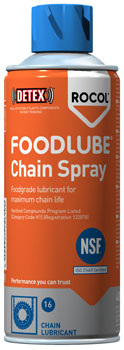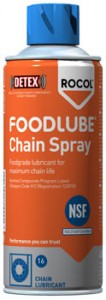New detectability makes FOODLUBE® safest ever
- Like
- Digg
- Del
- Tumblr
- VKontakte
- Buffer
- Love This
- Odnoklassniki
- Meneame
- Blogger
- Amazon
- Yahoo Mail
- Gmail
- AOL
- Newsvine
- HackerNews
- Evernote
- MySpace
- Mail.ru
- Viadeo
- Line
- Comments
- Yummly
- SMS
- Viber
- Telegram
- Subscribe
- Skype
- Facebook Messenger
- Kakao
- LiveJournal
- Yammer
- Edgar
- Fintel
- Mix
- Instapaper
- Copy Link
Posted: 1 March 2013 | ROCOL | No comments yet
ROCOL has introduced innovative caps and actuators on aerosol spray cans in the FOODLUBE range…


Leading UK food-grade lubricants manufacturer ROCOL has introduced innovative caps and actuators on aerosol spray cans in the FOODLUBE range to help reduce the risk of foreign object contamination during food and drink processing.


This means that, unlike traditional aerosol packaging, all caps and actuators on FOODLUBE packs can be identified using standard metal detection equipment should they become loose in food and drink processing areas.
The patent-pending DETEX caps and actuators are themselves manufactured from safe materials deemed acceptable by the US Food and Drug Administration for use in food processing plants.
ROCOL marketing manager Joanne Ferguson says: “The addition of DETEX caps and actuators represents another important step in helping food and drink processors avoid costly downtime, product recalls and the risk of reputational damage.
“We are continuously looking at new ways to help address safety risks, and this includes utilising new technology like DETEX wherever possible. Our corporate strength as part of the global ITW Group gives us privileged access to developments of this kind.”
FOODLUBE products are available for a wide range of applications across processing plants in the food, drink and clean industries. Individual lubricants are all NSF H1 registered, which means they have been independently assessed and deemed safe for processing equipment used to produce food and drink for human consumption.
Find out more about the FOODLUBE range at www.rocol.com.




